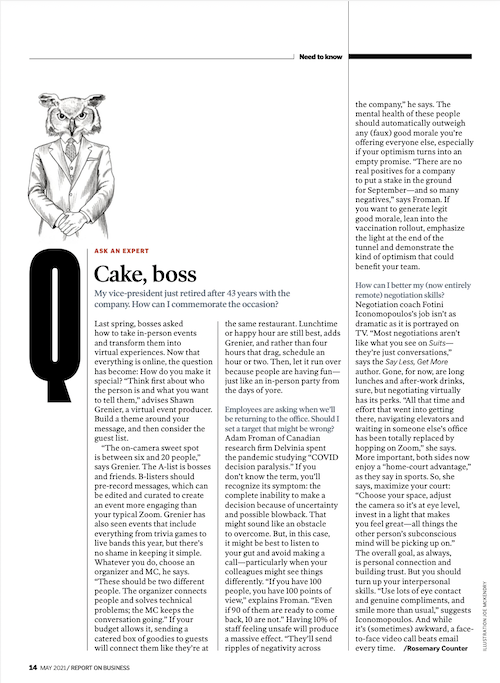Cake, boss
Report on Business: Ask an Expert
My vice-president just retired after 43 years with the company. How can I commemorate the occasion?
Last spring, bosses asked how to take in-person events and transform them into virtual experiences. Now that everything is online, the question has become: How do you make it special? “Think first about who the person is and what you want to tell them,” advises Shawn Grenier, a virtual event producer. Build a theme around your message, and then consider the guest list. “The on-camera sweet spot is between six and 20 people,” says Grenier. The A-list is bosses and friends. B-listers should pre-record messages, which can be edited and curated to create an event more engaging than your typical Zoom. Grenier has also seen events that include everything from trivia games to live bands this year, but there’s no shame in keeping it simple. Whatever you do, choose an organizer and MC, he says. “These should be two different people. The organizer connects people and solves technical problems; the MC keeps the conversation going.” If your budget allows it, sending a catered box of goodies to guests will connect them like they’re at the same restaurant. Lunchtime or happy hour are still best, adds Grenier, and rather than four hours that drag, schedule an hour or two. Then, let it run over because people are having fun—just like an in-person party from the days of yore.
Employees are asking when we’ll be returning to the office. Should I set a target that might be wrong?
Adam Froman of Canadian research firm Delvinia spent the pandemic studying “COVID decision paralysis.” If you don’t know the term, you’ll recognize its symptom: the complete inability to make a decision because of uncertainty and possible blowback. That might sound like an obstacle to overcome. But, in this case, it might be best to listen to your gut and avoid making a call—particularly when your colleagues might see things differently. “If you have 100 people, you have 100 points of view,” explains Froman. “Even if 90 of them are ready to come back, 10 are not.” Having 10% of staff feeling unsafe will produce a massive effect. “They’ll send ripples of negativity across the company,” he says. The mental health of these people should automatically outweigh any (faux) good morale you’re offering everyone else, especially if your optimism turns into an empty promise. “There are no real positives for a company
to put a stake in the ground for September—and so many negatives,” says Froman. If you want to generate legit good morale, lean into the vaccination rollout, emphasize the light at the end of the tunnel and demonstrate the kind of optimism that could benefit your team.
How can I better my (now entirely remote) negotiation skills?
Negotiation coach Fotini Iconomopoulos’s job isn’t as dramatic as it is portrayed on TV. “Most negotiations aren’t like what you see on Suits— they’re just conversations,” says the Say Less, Get More author. Gone, for now, are long lunches and after-work drinks, sure, but negotiating virtually has its perks. “All that time and effort that went into getting there, navigating elevators and waiting in someone else’s office has been totally replaced by hopping on Zoom,” she says. More important, both sides now enjoy a “home-court advantage,” as they say in sports. So, she says, maximize your court: “Choose your space, adjust the camera so it’s at eye level, invest in a light that makes you feel great—all things the other person’s subconscious mind will be picking up on.” The overall goal, as always, is personal connection and building trust. But you should turn up your interpersonal skills. “Use lots of eye contact and genuine compliments, and smile more than usual,” suggests Iconomopoulos. And while it’s (sometimes) awkward, a face- to-face video call beats email every time.
